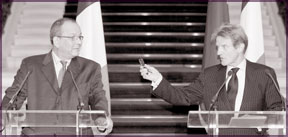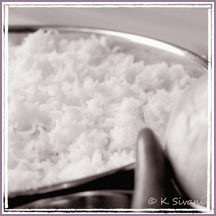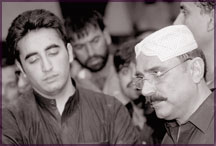|

France faces tough choices over Chad
by Hugh Schofield
France is observing the dramatic developments in Chad in a state of
nervous exasperation.
|

French Foreign minister Bernard Kouchner speaks (R) and Chadian
counterpart Ahmad Allammi speak during a press conference, on
February 05, 2008 at the quai d'Orsay ministry in Paris.
France's armed forces denied taking part in the fighting in
Chad, after a rebel leader accused French warplanes of opening
fire on civilians in the capital Ndjamena. -AFP |
The latest news that the rebels have pulled out of the centre of
N'Djamena - with President Idriss Deby still apparently in charge - has
come as a relief.
But, seen from Paris, the situation remains highly unstable.
The government of Nicolas Sarkozy is going to have to walk on
diplomatic and military egg-shells for some time yet.
The root cause of France's discomfort is that it is trying to pursue
two policy objectives that the rebel offensive has made incompatible.
Civil war
On the one hand, the government is adamant that the bad old days of
"la Francafrique" - when French troops regularly intervened to prop up
corrupt allies - have been consigned to history. There is therefore no
question of France's 1,450 soldiers permanently based in Chad being used
to keep Mr Deby in power.
As Mr Sarkozy's Cabinet Director Claude Gueant said on Sunday, "the
conflict in Chad is a civil war and the antagonists are Chadians; France
can only intervene in the context of an international mandate".
In fact a military co-operation agreement does exist between France
and its former colony, but officially this only extends to providing
logistical and intelligence aid. So far in the conflict France has
observed a strict neutrality, surprising some observers by not offering
even the kind of discreet help it has done in the past.
In 2006, for example, a French Mirage jet fired shots across the bows
of an advancing rebel column - thus delivering an unmistakeable message
not to go further. Nothing similar has happened today.
This neutrality is an awkward posture for France because of the
second of its two policy objectives.
This is the need, for now, to keep Idriss Deby in power. If the
French government feels no special affection for the man, the fact
nonetheless remains that the Chadian leader has become a key player in
France's wider regional ambitions. The focus of these ambitions is the
deployment - planned to take place as of now - of a new European
protection force in eastern Chad.
Mr Sarkozy has staked an enormous amount of prestige in promoting
this, the biggest ever EU peacekeeping force.
Officially given the go-ahead only a week ago, Eufor's task will be
to provide security for refugees from Darfur and other displaced
persons.
Eventually a mixed UN-African Union force should do the same job on
the Sudan side of the border.
For Mr Sarkozy, Eufor represents both the symbol of a new ethical
Africa policy, so different from the grubby arrangements of the past,
and a supreme test for Europe's emerging defence identity.
It took months of tough negotiations with Mr Deby to get the force
accepted.
It was nearly derailed by the Zoe's Ark charity fiasco late last
year, when French aid workers were convicted of trying to smuggle out
children.
And now, just as it was all about to happen, the plan has gone
pear-shaped. The deployment has been put on hold, and if the rebels win
it may never happen at all. Of course, for the French government, there
is no coincidence in the timing.
The rebels did not want Eufor to deploy because its presence would
hinder their freedom to manoeuvre against Mr Deby.
Painful dilemma
More disturbingly, the Sudanese government - generally accepted to be
the Chadian rebels' backer - also had strong reasons not to want Eufor
in place. They do not want any serious international force within reach
of Darfur. The rebels had to act fast. They left the Sudanese border
last Monday - the very day of Eufor's endorsement by Brussels - and were
in N'Djamena by week's end.
The dilemma for Paris has been painful: to intervene - and be
caricatured as a throw-back to the neo-colonialism of "la Francafrique"
- or not to intervene, and see a first chance to stand tall on the
African continent dwindle into the desert sands? So far the preferred
option has been to wait, and hope that fortune turns. Signs that the
rebels may have over-reached themselves - and their 500-mile supply
chain - have been greeted with barely disguised glee.
But, if the situation deteriorates, there is another option:
internationalisation. Foreign Minister Bernard Kouchner said on Monday
that France was, for the time being, keeping its distance from the
conflict. "But if there is a UN Security Council resolution or if the
African Union comes up with a new suggestion, things could change," he
said.
On Monday, the Security Council did pass a resolution condemning the
rebel advance and calling for governments to extend support to President
Idriss Deby. It remains to be seen whether that amounts to the cover
that France needs to intervene.
BBC
'The Palestinian dream is over'
by Khalil Al Assali,
Dr Mustafa Al Barghouthi, a member of the Legislative Council and a
prominent Palestinian activist, could not find a better word than
"disaster" to express his anger at the announcement made by Hamas
officials regarding a study that aims to separate the economy from
Israel and connect with Egypt.
 "These
declarations are very risky and briefly mean the separation of the West
Bank from the Gaza Strip and the end of the Palestinian dream," Dr
Barghouthi told Gulf News. Dr Barghouthi as well as the rest of the
Palestinian parties called for the immediate resumption of discussions
between Hamas and Fatah. "These
declarations are very risky and briefly mean the separation of the West
Bank from the Gaza Strip and the end of the Palestinian dream," Dr
Barghouthi told Gulf News. Dr Barghouthi as well as the rest of the
Palestinian parties called for the immediate resumption of discussions
between Hamas and Fatah.
"The talk that is spread in the media about suggestions and plans to
separate the Gaza Strip from the West Bank is very risky and is
inadmissible. No Palestinian could approve it at this time since it only
serves the Israelis," the Palestinian Arab Bloc added in a statement in
Ramallah on Sunday. "Hamas is driving the nation to hell.
This speech only benefits Israel which in every meeting between
President Mahmoud Abbas and Israeli Prime Minister Ehud Olmert excuses
about Hamas and the Gaza Strip are brought up.
"And now this suggestion that is approved by some states in the area
has come up in order to destroy the Palestinians' hope. Have mercy on
the nation," the Chairman of the Negotiation Department in the
Palestinian Liberation Organisation Dr Saeb Iriqat told Gulf News.
The economic analyst Taher Al Hajj asserted that Hamas, from this
separation, wants to enforce its claimed stance that Arabs are the
strategic depth of the Palestinian nation forgetting that this step will
have negative economic effects. He also added that due to this
separation, Israel will lose approximately three billion dollars which
is about the amount of the Strip's imported goods and materials.
The negative impact that may appear is the transformation of the Gaza
market to a market of forged currency which will, as a result, lead to
the crash of the rest of the Palestinian economy.
A Gaza-based businessman, who asked not to be named, told Gulf News
that he is working on transferring his business and factories abroad and
specifically to Egypt as the economic condition is about to crash due to
the political situation and Hamas' disorder.
As for Israel, relief was evident in the area. "Everyone knows that
the connection between the Gaza Strip and the West Bank does not benefit
Israel, it rather benefits Palestine.
"Therefore, we should encourage Hamas' complete separation from
Israel and its connection with Egypt," the former General and former
chairman of the National Security Council Uzi Dayan said on Sunday in an
official broadcast. Egypt has not reacted to Hamas' suggestion.
Israel's Minister of Agriculture Shalom Simhon rushed to confirm in a
weekly governmental session on Sunday that Israel is studying the
possibility of preventing the exportation of agricultural production
from the Gaza Strip to Europe and other states via Israel due to the
breakthrough of the borders in Rafah and the entrance of Egyptian
agricultural production to the Gaza Strip without supervision.
The Gulf News, UAE
Newly-wed Sarkozy woos nation
by Emma Jane Kirby
"There's no better place to spend my honeymoon than here!" grinned
the newly-wed French president, as he addressed steel workers at Arcelor
Mittal in Gandrange. If he expected applause and a congratulatory cheer
he did not get it.
 The
subsequent booing suggested the employees, whose jobs are under threat,
had a lot more on their mind than Nicolas Sarkozy's private life. The
subsequent booing suggested the employees, whose jobs are under threat,
had a lot more on their mind than Nicolas Sarkozy's private life.
A new poll, released on Sunday, indicated that the president's
popularity ratings had plummeted.
The LH2 poll for the left-leaning Liberation newspaper said 55% of
those surveyed had a negative opinion of President Sarkozy, with just
41% thinking he was doing a good job - that is a 13% drop from a month
ago.
Respondents said one of the main reasons they had lost confidence in
Mr Sarkozy was because he seemed to spend more time worrying about his
personal life than he did the concerns of France.
The front cover of Liberation today had a cartoon of Mr Sarkozy with
his arm around Carla Bruni with the headline "The French people and
Sarkozy - The Divorce".
Now that the fairy-tale romance of the president and the pop star has
reached a "happily ever after" conclusion, France will be looking for a
lot more from Nicolas Sarkozy than just a few glossy photos of his first
kiss with the new First Lady.
The country remains in poor economic health, with very little growth
and relatively high unemployment, while the daily cost of living
continues to rise.
'On the ball'
So what became of the hard-nosed reformer I followed during the
election campaign, who promised France an economic revolution? Has love
turned him soppy? That is not an impression Nicolas Sarkozy wants to
give.
It is quite deliberate that the newly-weds did not take a honeymoon.
The French president is keen to show his country that only a day after
his wedding, he has already got his eye on the ball again.
Two National Assembly by-elections were held in the Paris region on
Sunday and Sarkozy's right-wing UMP party lost one of the seats to the
Socialists. With municipal elections coming up next month, he knows he
cannot afford to give much ground.
Carla's new role
But will Carla Bruni prove to be an asset or a distraction to the
president? She does after all have a colourful past, with a string of
high-profile ex-boyfriends, who include rock stars Mick Jagger and Eric
Clapton, and she has given interviews in which she has declared she
believes in polygamy.
Later this month the singer is due to release another album - it will
be the first time that France will have had a First Lady featuring in
the pop charts.
She may be unorthodox compared to previous presidents' wives, but
Colombe Pringle from the celebrity magazine Point de Vue believes she
will make France proud.
"Carla knows what the job is going to be, maybe she doesn't know all
about it, maybe she doesn't measure that it's a difficult one and that
it's going to ask a lot of her personal time, but at least she accepts
it.
"I mean, when she says yes to the president, she says yes to France."
Ex-model and singer Carla Bruni is used to being in the spotlight.
But if she wants to help her husband's career, the new Mrs Sarkozy must
be prepared to take a back seat.
BBC News, Paris
Thais hold key to rice shortages
by Jonathan Head
If there is such a thing as the world's rice-bowl, it lies in the
steamy, flat land surrounding the lower reaches of the mighty Chao
Phraya river, which ends its journey to the sea in Thailand's capital,
Bangkok.
 About
150km (93 miles) north of Bangkok is the province of Suphan Buri, home
to Thailand's most productive rice paddies. And Thailand has for many
years been the world's largest exporter of rice. About
150km (93 miles) north of Bangkok is the province of Suphan Buri, home
to Thailand's most productive rice paddies. And Thailand has for many
years been the world's largest exporter of rice.
Enriched by the alluvial soil washed down by the river, this land can
produce up to four harvests a year.
In one sweeping vista you can watch barefoot farmers scattering seeds
into the grey-brown mud, see fields of vibrant-green young shoots, and
watch other farmers harvesting the mellow gold rice that has already
ripened.
It is backbreaking work, and an unpredictable living.
A few years ago many of the farmers were weighed down by debt. But
not this year. Rice prices shot up by 50% last year, and they are still
rising.
According to the UN Food and Agriculture Organization's index of food
prices, they have reached their highest levels in 20 years.
"It's been unexpectedly good for us over the past year", said
76-year-old Sawan Katawut, who is head of the Suphan Buri Farmers
Association.
"Maybe it's because of natural disasters in other countries, or
problems with rice prices there - but it has been a windfall for us."
Vital commodity
At the regional headquarters of the UN World Food Programme (WFP)
they are monitoring the sharply rising food prices with growing alarm.
"For millions of people across Asia this is a real crisis", says Tony
Banbury, the WFP's Regional Director for Asia.
 "Imagine
if you're a family of four, getting by on a dollar a day, and spending
70% of that on food, and all of a sudden prices are doubling - you can't
possibly get by." "Imagine
if you're a family of four, getting by on a dollar a day, and spending
70% of that on food, and all of a sudden prices are doubling - you can't
possibly get by."
Rice is an unusual commodity. A staple for two-thirds of the world's
population, most is consumed locally.
Just 7% is traded on the international market - but that 7% is vital
for countries like Bangladesh and Afghanistan that rely heavily on
imports.
It is also a very political commodity, because it is so intricately
linked to a sense of security and prosperity for many societies in Asia.
The price of rice is watched very closely by governments.
Even Japan, among the world's richest and most industrialised
societies, maintains a huge rice stockpile - although it is impossible
to imagine a scenario in which the wealthy Japanese could not buy it on
the international market.
So as prices have risen governments that normally export rice have
stopped, to try to maintain stocks at home.
Over the past year, India and Vietnam, the world's second and third
largest exporters, have blocked exports, as has China, the world's
biggest rice consumer, but an important supplier for perennially hungry
North Korea.
Suddenly everyone wants Thai rice - and Thailand always produces more
than it needs.
Unlike poorer rice-producing countries, where consumption of rice
rises as incomes go up, Thailand's people have reached an income level
where rice consumption is declining, as they eat a greater variety of
foods.
In a dingy little office, tucked out of sight down a small alley in
Bangkok's Chinatown, Supoj Vongjirattikarn wields a telephone in each
hand, speaking rapidly and flicking his abacus with his fingers.
He is one of around 70 rice brokers in Bangkok who literally keep the
international rice lifeline going - matching orders from abroad with
suppliers, the thousands of rice mills in Thailand that take and process
the farmers' harvest. And he has never been busier. "Thailand is lucky,"
he said between phone calls.
"We have plenty of rice, just as our main competitors Vietnam and
India don't have enough for export."
Nightmare scenario
The reasons for the soaring rice prices are complex. Chookiat
Ophaswongse, at the Thai Rice Exporters Association, says demand is
rising fast in new markets like Africa, but production is falling, as
farmers elsewhere have turned to more profitable crops like bio-fuels.
Rice, he says, is merely tracking the price boom in other
commodities, and he expects prices to continue rising. For the first
time in recent history, global demand will exceed global supply.
For the WFP this is a nightmare. Already it is being asked for extra
food assistance from Afghanistan and Bangladesh as their populations
struggle to pay for dwindling stocks of rice.
It is very worried about the impact of prices on North Korea and East
Timor - both vulnerable to food shortages. Yet because of rising prices,
it cannot afford to buy as much on the international market as in
previous years.
"We're especially concerned about urban populations, populations that
we used not to help", says Tony Banbury.
"People like casual labourers who don't have a coping mechanism for
these prices, who can't grow any food of their own."
So are Thailand's rice producers laughing all the way to the bank?
Actually, they are not.
"We don't like it when the price moves too fast," says Chookiat
Ophswongse.
"As exporters we can get caught out. It is much easier for us to
handle rice prices when they are more stable."
BBC
Bhutto's political will released
The Pakistan People's Party has released the political will of former
leader Benazir Bhutto in which she backs her husband to be party leader.
 The
PPP originally disclosed the contents of the document shortly after her
assassination in December. The
PPP originally disclosed the contents of the document shortly after her
assassination in December.
A PPP spokesman said they were now releasing it to end speculation
about its contents.
Analysts say the document could enhance the political position of Ms
Bhutto's widower, Asif Zardari.
Mr Zardari is currently in charge of the party. Their 19-year-old son
Bilawal is the titular head.
The handwritten, one-page letter dated 16 October says that Asif Ali
Zardari should be interim leader until a new permanent party head is
appointed.
Mr Zardari took over the leadership of the party after Ms Bhutto was
killed. She died in a suicide bombing and shooting attack in Rawalpindi
while campaigning for elections in December.
"I would like my husband Asif Ali Zardari to lead you in this interim
period until you and he decide what is best," Ms Bhutto's letter states.
"I say this because he is a man of courage and honour. He spent
eleven and a half years in prison without bending despite torture.
"He has the political stature to keep a party united." The letter -
written two days before Ms Bhutto's return to Pakistan from exile and 12
weeks before her assassination - urged Pakistan People's Party (PPP)
supporters to continue the struggle for change.
"I fear for the future of Pakistan. Please continue the fight against
extremism, dictatorship, poverty and ignorance," she wrote.
'Foil controversies'
 At
a press conference to announce the release of the will, PPP spokeswoman
Sherry Rahman said that "some enemies wanted to create chaos in the
party by spreading false speculation about the contents of the will". At
a press conference to announce the release of the will, PPP spokeswoman
Sherry Rahman said that "some enemies wanted to create chaos in the
party by spreading false speculation about the contents of the will".
"That is why the party high command has decided to share the will
with the public and the media to foil all such controversies and keep
the party united," she said.
Ms Bhutto's killing on 27 December while leaving an election rally in
Rawalpindi led to a six-week delay to parliamentary elections now
scheduled for 18 February. Correspondents say Mr Zardari is a
controversial figure in Pakistan, where he has faced repeated
accusations of corruption.
PPP spokesman Farhatullah Babar said that the release of the will was
not being done to strengthen Zardari's position within the party.
He said that the party would formally decide who was the party's long
term leader after the election results are known.
BBC
Russian designer invents flying rug for civil and military use
Russian aircraft designer and inventor, Alexander Begak, created a
unique aircraft which he named as Evolution. The aircraft is capable of
traveling on land, water and air.
 "This
is a universal kind of transportation. It can fly at the height of 4,000
meters above the ground and cover the distance of up to 400 kilometers
without additional refueling. Its 30 horse-power motor allows to develop
the speed of 160 km/h in the air and 80 km/h on land. An on-board
computer controls pilot's actions," Alexander Begak told ITAR-TASS. "This
is a universal kind of transportation. It can fly at the height of 4,000
meters above the ground and cover the distance of up to 400 kilometers
without additional refueling. Its 30 horse-power motor allows to develop
the speed of 160 km/h in the air and 80 km/h on land. An on-board
computer controls pilot's actions," Alexander Begak told ITAR-TASS.
Unlike heavy aircraft of modern-day aviation, Evolution is easy to
transport. It is made of ultra-light coal-plastic and kevlar fibers. The
total weight of the aircraft makes up only 60 kilos. The fragile as it
may seem construction of the aircraft is protected with the hull made of
ultra-strong materials.
The designer presented his invention at Russia's recent MAKS-2007 air
show. Experts highly estimated the novelty. Evolution can quickly find a
way out of a critical situation. In case of emergency in the air, the
parachute system of the aircraft softens the gliding to the ground. When
traveling on the water surface, the pilot can use the inflatable
emergency device that will not let Evolution drown.
Alexander Begak was working on his aircraft for two years. Evolution
has passed over 100 tests. Specialists from Russia's major aviation
corporations, such as Roskosmos, participated in the research as well.
The parts of the aircraft were produced at enterprises of Roskosmos,
Sukhoi and Moscow Aviation Institute.
"We want to restore the fleet of ultra-light aviation - the project,
which aviators turned down in the 1950s for the benefit of strategic
defense goals," Begak said.
It is worthy of note that ultra-light aircraft can come in handy for
non-civil purposes too. Evolution can serve as reconnaissance aircraft
invisible to radars due to its plastic equipment. It can patrol
frontiers, conduct day and night photography, mapping and monitoring.
Alexander Begak is a designer, pilot and parachute jumper.
Pravda, Russia |
